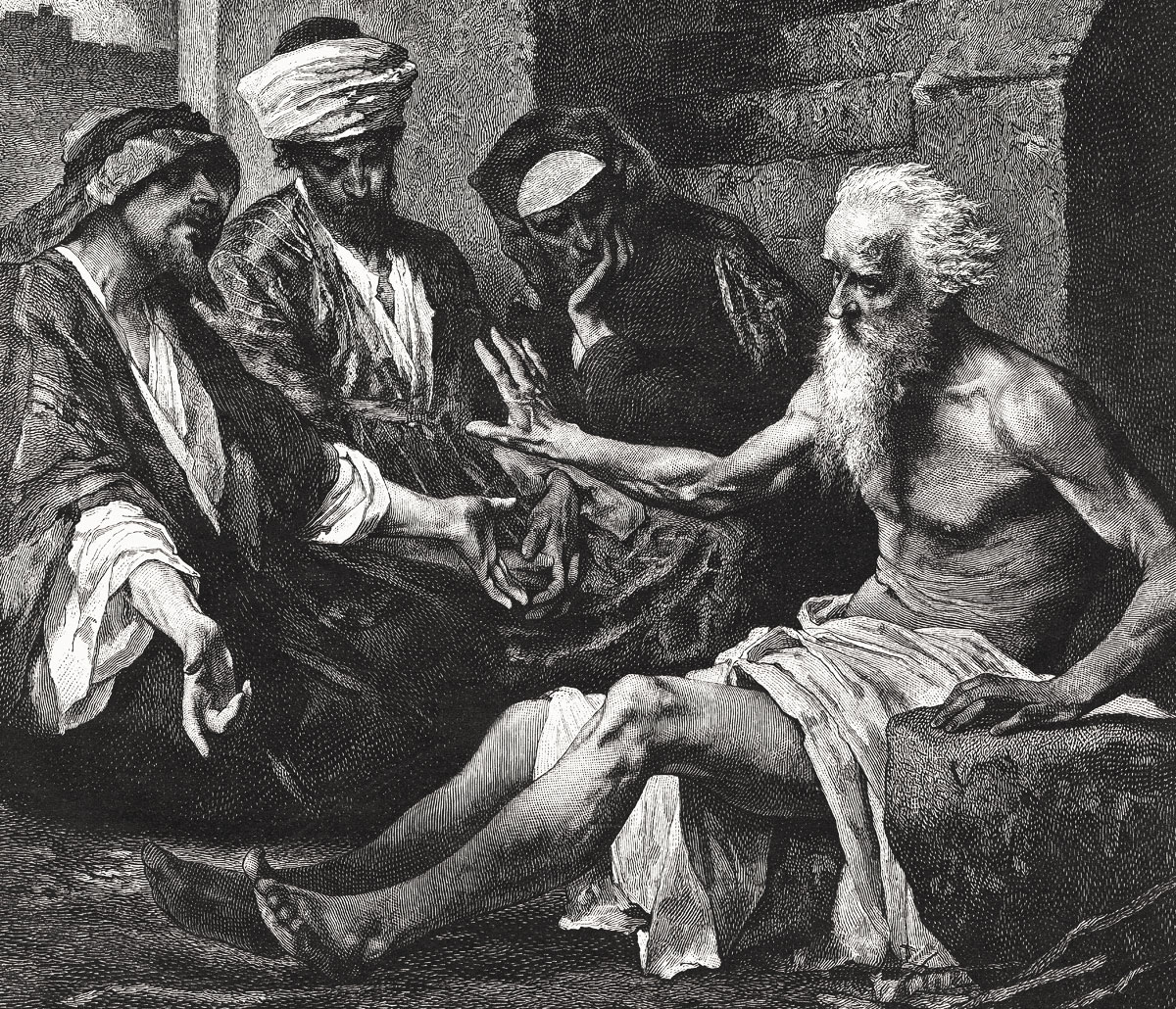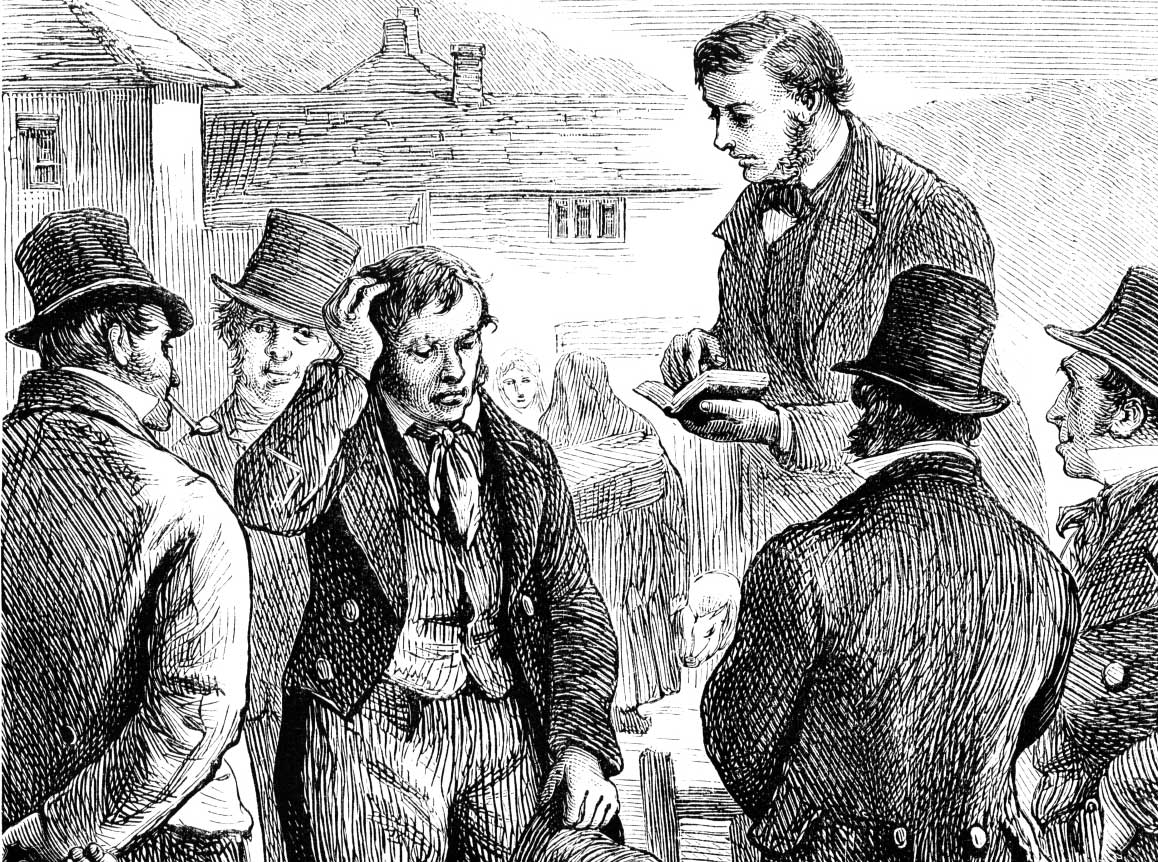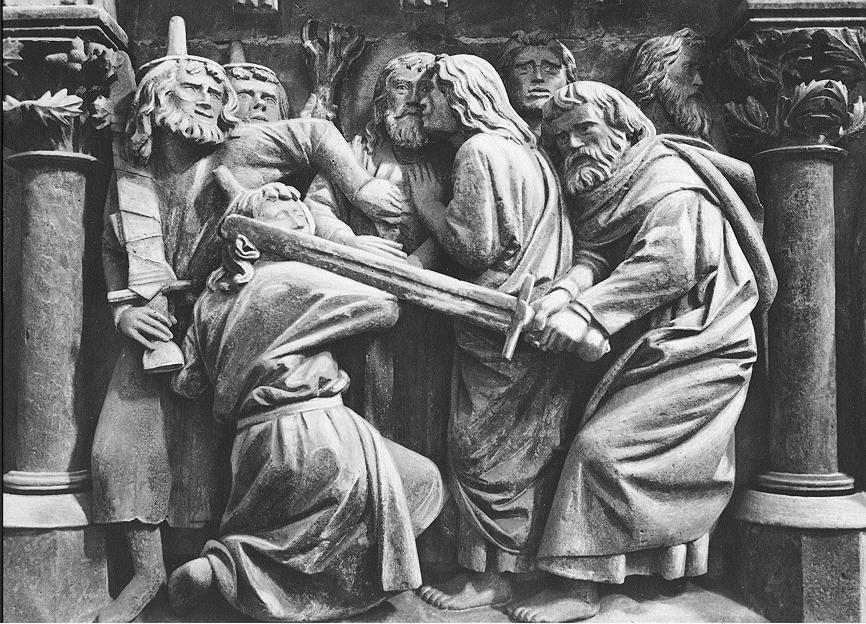Editorial
State of Separation
When Caesar Wants a Thing That Is God’s
by David Mills & Anthony Esolen
The extent to which the Christian can accept Caesar’s help in serving God depends upon the extent to which Caesar gives to God the things that are his. In this country, for a long time, Caesar has given to God some of the things that are his by recognizing and upholding the moral order—not completely or perfectly, by any means, but effectively enough as far as he felt able to go. Caesar was happy to help Christians serve their common ends, and Christians were able to accept his help.
Now, at least in some places, Caesar does not want to help the way he used to, because he no longer gives to God his recognition of the moral order. What he and the Christians once agreed upon—the nature of marriage as the union of a man and a woman, for example—he now sees as prejudice and bigotry. And so, quite rightly from his point of view, he will help Christians only if they now give to him the things that they believe are God’s.
O’Malley’s Defiance
As readers will know, the Commonwealth of Massachusetts forced the Archdiocese of Boston to close its adoption service, after 103 years of helping to place orphans and unwanted children with new families, by giving Catholic Charities an ultimatum: Either allow homosexual couples to adopt children or shut up shop. The state holds that “married” homosexual couples are married in every sense that a man and wife are married, and have every right a man and wife have, and that the state cannot help anyone act otherwise.
The archdiocese had no choice. Cardinal Sean O’Malley’s decision was inevitable: The Catechism of the Catholic Church teaches quite clearly that man is not permitted to will evil that good may result, or to engage in an evil action so that he might preserve the opportunity to do good.
To capitulate to the state would be to cooperate in the grave social evil of undermining the institution of marriage and the order of the sexes, fashioned by God himself; to acknowledge the supremacy of the state in compelling condonement of actions obnoxious to the church’s tenets and to that very social order whose preservation is the state’s sole reason for existence; and to deliver small children the church has in its care into unnatural “families,” not only depriving them of a mother or (more frequently) a father, but suggesting to them the lie that consent alone makes all sexual expression licit.
The archdiocese could not agree, as any fair observer must have foreseen. Then why the compulsion? Homosexual people in Massachusetts can already adopt children; it is unlikely that anyone would be seriously inconvenienced by the church’s policy. The conclusion seems inescapable: The church was given the ultimatum not so that homosexuals would benefit, but so that the church would be hurt, either by a capitulation that would signal its subservience and irrelevance evermore, or by a curtailment of the freedom of Catholics to practice their faith in the public square.
At least some of those who delivered the ultimatum can read and think, and knew that the church that cannot permit the direct and willed killing of an innocent human being so that thousands might be saved from disease, would not be able to hand a single child over to a homosexual couple, even when that action would preserve their opportunity to place thousands of others in real, that is to say natural, families.
That being the case, the enforcers in this case must have been looking forward with complacency to this predictable result. That it would hurt children who would have to wait much longer before finding a family to adopt them, if they found a family at all, did not matter.
Responding to Caesar
Christians must respond to Caesar’s abandoning of his previous arrangement in two ways. The first is to clean up their own house, so that the church speaks with integrity and power. The state tends to move in only when the church has left room. (Would Massachusetts oppress our national life with so many pro-abortion politicians if more Catholics there followed the church’s teaching?) This itself means two things.
One, ensure that everyone who makes decisions or speaks for the church obeys—nay, not only obeys but believes—its teaching. Too many churches have put Caesar’s agents in charge of their ministries, and promoted too many people whose confused loyalties left them acting as double agents, at best. The church must have its representatives single-minded.
Faced with an order from the Vatican to stop giving children to homosexual couples, the head of Catholic Charities in San Francisco insisted to the press that “our policies and procedures have not changed.” The new archbishop of San Francisco should call the man into his office and ask him if he is going to change the policies and procedures. If he says he will not, the archbishop should fire him.
Many meetings like this should be held in almost every diocese, presbytery, and district headquarters across the country. The authorities must be willing to endure charges of “witch hunts” and “purges” and starched reminders of the “lessons of the Inquisition” from the secular media and attempts at sabotage from their own liberals, but this will be a small price to pay for institutional coherence, especially as the media will eventually go on to something else, and the liberals will tire of complaining. The leaders of the Southern Baptist revival give us good models.
Two, ensure that the church’s own life reflects the moral order it teaches. For if we are where we are now, when even little old ladies smile complacently at forms of sodomy they never knew existed when they were young married women many years ago, then it is in part because the orthodox Christian churches have failed to preach, in season and out of season, the full doctrine of the Scriptures regarding human sexuality—have failed to do so even in those areas where they all agree.
Who will believe us now, and what imperialistic government agency will hesitate to act, with our corner-cutting and eye-averting, our complacency with divorce, even among the clergy, our toleration of clerical sexual predators (a Protestant as well as a Catholic problem), our hip youth groups that provide teenagers with opportunity when they already possess the motive and the means—in other words, with a practice not very different from anyone else’s? Yet we have no choice.
Homosexuality? How about blistering and frank condemnations of fornication, based on a keen insight into what that sin can do to a human soul? The destruction of marriage by the creation of pseudo-marriages through “civil covenants”? How about ceasing to cooperate with the culture of serial monogamy in the churches?
The all-corrupting belief that love is a method of self-expression, to be given to whomever pleases one (man or woman or both) for as long as it pleases, and that the government must aid these liaisons? How about insisting on all those things that mark marriage as a commitment of the will and a social act, like permanence and the openness to children? Corruption of manhood? Where to start with that one?
The churches must overtly reject the culture of the sexual revolution as it has formed even church life, and be willing to see the pews empty as many choose the revolution. And perhaps fill again with people, victims of the revolution, who now see a place in which they can find healing. This kind of church would affect public policy simply by living its life, not to mention by the votes and actions of its people.
Giving to God
The second thing to do in response to Caesar’s new attitude is to tell Caesar that these things are God’s, not his, and then to act as if they were God’s. The managerial mind typical among hierarchs of all sorts will not do.
One, Christians must be willing to refuse to supply the services any longer, if Caesar insists on their violating their consciences to do so. This the archdiocese did.
Two, in some cases they must be willing to provide the service, but to refuse to provide it on Caesar’s terms. For example, pro-abortionists may have their way in forcing all ob-gyn residents to learn how to do abortions, which will require them to help abort real children and effectively outlaw Christian doctors in this field. We need to begin to think seriously about ways of supplying medical care and employing doctors the state has outlawed.
When to act in one way and when in the other is a prudential choice, on which the boldest Christians will disagree. Some will argue that the usual call is to refuse to cooperate, others that active resistance is often required. The choice requires discernment, but it begins with the absolute refusal to give to Caesar anything that is God’s, in a way many Christians—Boston’s Catholic Charities having been an example—have failed to do in the past.
The Boston affair warns us of similar struggles to come. A sexualized society will not compromise on what it thinks is sexual liberation. San Francisco’s board of supervisors reacted to the Vatican’s statement in 2003 against homosexual adoptions by calling it “hateful and discriminatory rhetoric [that] is both insulting and callous, and shows a level of insensitivity and ignorance which has seldom been encountered by this Board of Supervisors.”
They are no happier today. (As we write, they’ve directed another blast at the Vatican and one at a group of Evangelical youth rallying in a San Francisco park.) They are not long going to let insulting, callous, insensitive, and ignorant people have a role in public policy, and even (to the extent they can affect it) in the ordering of their own religious lives.
Every day, in fact, brings new stories of more and more overt attacks on Christians for being Christians, many from people with some degree of political power. As we said at the beginning, what was once the accepted understanding of things is now seen as prejudice and bigotry, the rejection of homosexual “marriages” being thought as obviously wicked as racism, and as clearly the duty of the state to outlaw, to take only the most obvious example.
The Catholic Church is the most exposed, because its institutions are so big and thus so entwined with the state. But all others are also vulnerable. All such institutions would be wise to reflect upon what they can and cannot do and prepare themselves to say no when the state insists they do what they cannot do.
David Mills has been editor of Touchstone and executive editor of First Things.
Anthony Esolen is Distinguished Professor of Humanities at Thales College and the author of over 30 books, including Real Music: A Guide to the Timeless Hymns of the Church (Tan, with a CD), Out of the Ashes: Rebuilding American Culture (Regnery), and The Hundredfold: Songs for the Lord (Ignatius). He has also translated Dante’s Divine Comedy (Random House) and, with his wife Debra, publishes the web magazine Word and Song (anthonyesolen.substack.com). He is a senior editor of Touchstone.
subscription options
Order
Print/Online Subscription

Get six issues (one year) of Touchstone PLUS full online access including pdf downloads for only $39.95. That's only $3.34 per month!
Order
Online Only
Subscription

Get a one-year full-access subscription to the Touchstone online archives for only $19.95. That's only $1.66 per month!
bulk subscriptions
Order Touchstone subscriptions in bulk and save $10 per sub! Each subscription includes 6 issues of Touchstone plus full online access to touchstonemag.com—including archives, videos, and pdf downloads of recent issues for only $29.95 each! Great for churches or study groups.
Transactions will be processed on a secure server.
more from the online archives
calling all readers
Please Donate
"There are magazines worth reading but few worth saving . . . Touchstone is just such a magazine."
—Alice von Hildebrand
"Here we do not concede one square millimeter of territory to falsehood, folly, contemporary sentimentality, or fashion. We speak the truth, and let God be our judge. . . . Touchstone is the one committedly Christian conservative journal."
—Anthony Esolen, Touchstone senior editor









